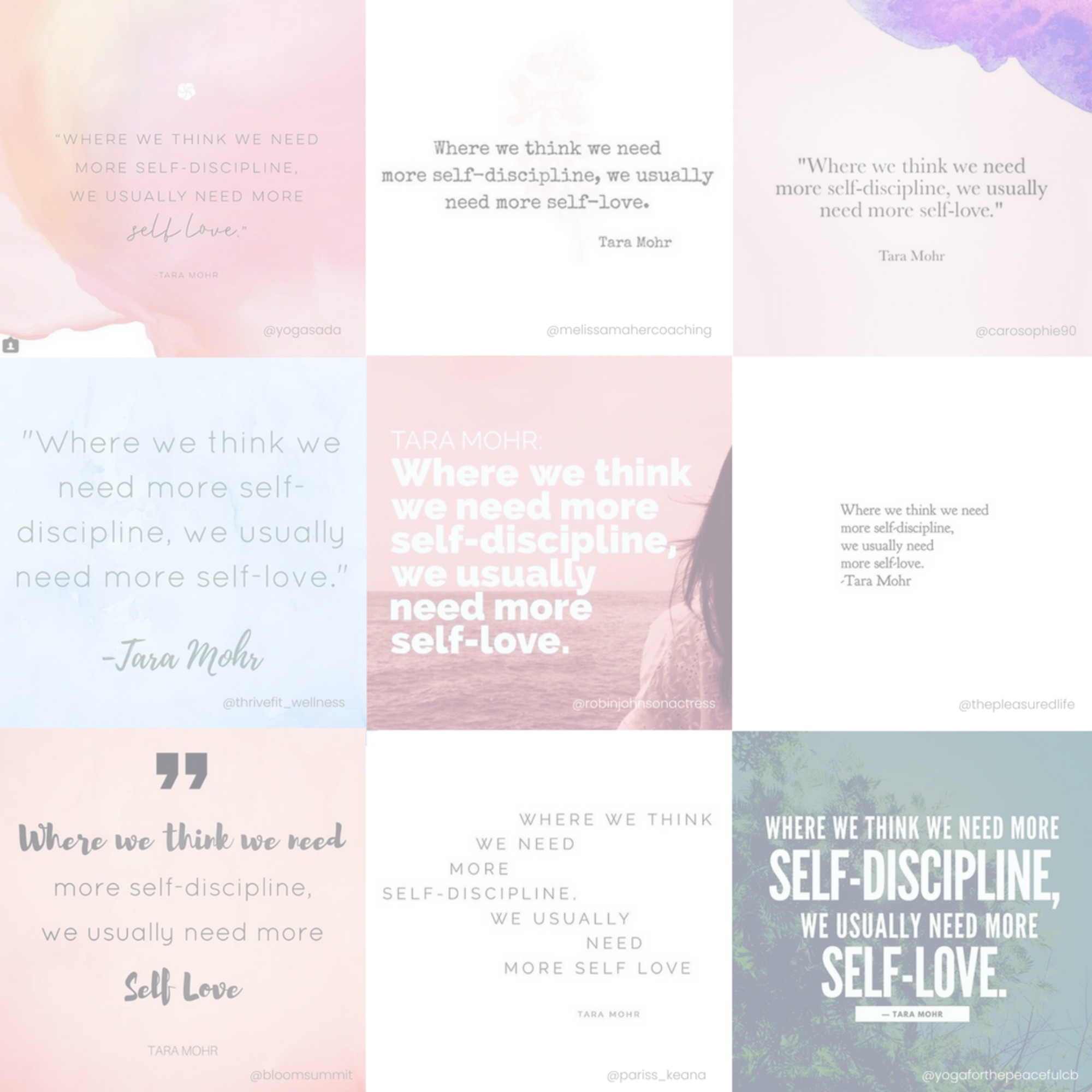Where we think we need more self-discipline, we usually need more self-love.
Several weeks ago, I noticed that those words from the Playing Big book were being shared widely on social media, with people taking the time to format them and give them their own visual expression.
Everywhere they were posted, they seemed to resonate strongly with readers, and that has intrigued me. So I thought today I’d delve deeper into this topic. What do these words really mean? What do they ask us to do differently? And what about this idea are we so hungry for and why?
We tend to think we need more self-discipline when we aren’t taking consistent action toward our goals: we want to exercise regularly but we aren’t; we aim to meditate every evening but we haven’t been consistent; we committed to track our money more closely, but fell off the wagon.
Then we tend to say to ourselves, in some version: “If I could only be more self-disciplined…” That’s our story about the situation, that we lack willpower or discipline.
Yet I will tell you after a lot of coaching conversations that self-discipline is never the missing ingredient in these situations.
What is needed is not more self-discipline or will, but one of these three things:
1. Practical adjustments to routines, schedules, support systems. I think of one woman who believed she just didn’t have the self-discipline to get up early every day. With some self-reflection, she discovered that she really just needed to reduce her commitments so she could go to bed a few hours earlier. Then the new wake-up time became no problem. Or, I think of another woman who thought she lacked the self-discipline to save money, but you know what? She had no problem doing so once she put a monthly transfer on automation. Where we think we need more self-discipline, we need more self-love. Sometimes that self-love expresses itself through the very practical routines, supplies, support systems we put in place to get us where we want to go.
2. Inner work. Other times, when we assume that we lack self-discipline, our flow of motivation is actually getting blocked by fear. I think of one woman who had come to feel she wasn’t publishing on her blog regularly because she lacked the self-discipline. But within a few minutes of coaching around the topic, it became clear that the core issue was fear of what people would think when she shared her ideas more publicly.
Fear is tricky, and subtle, and we put lots of fancy explanations on top of it that can hide it. When our motivation suddenly dips or we find ourselves behaving in ways we label “lazy,” quite often underneath we find fear – especially fear of change, failure, or (for women in particular) fear of separating from others in our life as we step into new ways of being.
In these situations, we do not need more self-discipline (and no amount of self-discipline could get us to ramrod past our fear! Fear will always win out if it’s unexamined or unconscious.) What we need is self-love, manifest through gentle, self-compassionate inquiry into what’s getting stirred up. That can happen through journaling, sharing out loud to a supportive group or friend, processing fear through making art, or through a session with a therapist or coach.
3. Changing the goal. Sometimes the problem is that we’ve given ourselves what I call a “should-goal” – an aim that comes from a sense of should, often drawn from others’ expectations, or your own inner critic’s marching orders. In my own life, I’ve set “should-goals” about going to the gym, “networking” with people in my field, posting regularly on social media, to name a few. None of these things had particular resonance in my heart or soul, and because they were “shoulds” I couldn’t keep up motivation around them. Here, the issue for us is not really a lack of self-discipline, but rather that we are working toward the wrong goal – one we are never going to have a wellspring of energy toward.
We’ve got to set what I call gift-goals, goals that are resonant with our values, our temperaments – goals that feel like gifts to give ourselves. (There’s much more on how to do that in the Playing Big book). In my case, I had to find alternative versions of my “should-goals” that were more true to me – for example, getting to dance class (not the gym) and connecting with a few people I truly admire in my field (not doing a lot of networking).
So, if you are struggling with motivation or consistent action in any area of your life, I’d look at these three areas:
1) Is this a should-goal or a gift-goal? If it’s a should, start by shifting the goal into one that is more resonant for you. (Check out our handout on creating gift-goals, here).
2) If it’s a gift-goal, is there a fear blocking your motivation? How can you feel it, unpack it, move through it – all with loving-kindness toward yourself?
3) Or, do you simply need to change the practical pieces – the time you’ve made available, the level of support you’ve put in place – to make it easier for you to take the action you want to take?
Last but not least, I think we have to pay attention to the resonance of this idea. The spread of these words across the web tells me that many of us recognize that something about our stories regarding self-discipline has lead us astray, and is false. Some part of tus knows that there is possibility in bringing self-love to those very places. If you work with people – as a coach, facilitator, counselor – how can you bring more of this idea forward? If you are a friend, a parent, a partner in conversation with others about their goals, how can you bring more of this idea to those conversations?
Want to set gift-goals or work with others on setting theirs? Grab my PDF on creating gift-goals here, with journaling prompts and coaching questions to help you do just that.
With love,
Tara







